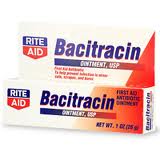What is Bacitracin?
 Bacitracin injection is an antibiotic that treats staph infection caused by a bacteria called staphylococcus (STAF-il-oh-KOK-us).
Bacitracin injection is an antibiotic that treats staph infection caused by a bacteria called staphylococcus (STAF-il-oh-KOK-us).
Bacitracin injection is used in infants to treat pneumonia. It is also used to treat an infection that causes pus to build up between the lungs and the membrane that covers them.
Bacitracin injection may also be used for purposes other than those listed in this medication guide.
What is the most important information I should know about Bacitracin?
Before your child receives bacitracin injection, tell the doctor if the child has a history of kidney disease.
Many other drugs can damage the kidneys and should not be used together with bacitracin. Tell your doctor if your child is receiving chemotherapy, medicines used to treat a bowel disorder, medications to prevent organ transplant rejection, antiviral medications, or any other injected antibiotics.
Get emergency medical help if your child has any of these signs of an allergic reaction: hives; difficulty breathing; swelling of the face, lips, tongue, or throat.
Serious side effects of bacitracin injection include urinating less than usual or not at all, blood in the urine, lower back pain, or painful urination.
Make sure your child receives this medication for the entire length of time prescribed by the doctor. Your child’s symptoms may get better before the infection is completely treated. Bacitracin injection will not treat a viral infection such as the common cold or flu.
What should I discuss with my healthcare provider before taking Bacitracin?
Your child should not receive this medication if he or she is allergic to bacitracin.
Before receiving bacitracin injection, tell your child’s doctor if the child is allergic to any drugs, or if your child has a history of kidney disease. If your child has either of these conditions, he or she may not be able to receive bacitracin, or may need dosage adjustments or special tests during treatment.
Bacitracin Side Effects
What are the possible side effects of Bacitracin?
Get emergency medical help if your child has any of these signs of an allergic reaction: hives; difficulty breathing; swelling of the face, lips, tongue, or throat.
While receiving bacitracin injection, your child will be watched for the following serious side effects:
- urinating more than usual or more often
- urinating less than usual, or not at all (fewer wet diapers)
- blood in the urine
- lower back pain; or
- painful urination
Less serious side effects include:
- nausea, vomiting
- mild skin rash; or
- pain, burning, or swelling where the medicine was injected
This is not a complete list of side effects and others may occur. Tell your doctor about any unusual or bothersome side effect. You may report side effects to FDA at 1-800-FDA-1088.
Bacitracin Interactions
What other drugs affect Bacitracin?
Before your child receives bacitracin, tell the doctor if your child is receiving any of the following drugs:
- cancer medications (chemotherapy)
- medicines used to treat a bowel disorder, such as mesalamine (Pentasa) or sulfasalazine (Azulfidine)
- medicines used to prevent organ transplant rejection, such as sirolimus (Rapamune) or tacrolimus (Prograf)
- any other injected antibiotics such as amikacin (Amikin), amphotericin B (Fungizone, AmBisome, Amphotec, Abelcet), or streptomycin; or
- antiviral medicines such as adefovir (Hepsera), cidofovir (Vistide), or foscarnet (Foscavir)
Many of these other drugs can damage the kidneys. If your child is receiving any of these drugs, he or she may not be able to receive bacitracin, or may need dosage adjustments or special tests during treatment.
There may be other drugs that can affect bacitracin injection. Tell your doctor about all your child’s prescription and over-the-counter medications, vitamins, minerals, herbal products, and drugs prescribed by other doctors. Do not start a new medication without telling your child’s doctor.
What should I avoid while taking Bacitracin?
Follow your doctor’s instructions about any restrictions on food, beverages, or activity while your child is receiving bacitracin injection.
Bacitracin Dosage
How should I take Bacitracin?
This medication is given as an injection into a muscle. A doctor, nurse, or other healthcare provider will give your child this injection.
Lung infections in infants are serious conditions, and your child will most likely be kept in the hospital while being treated with bacitracin injection.
To be sure this medication is not causing harmful effects, your child’s kidney function may need to be tested on a regular basis. Do not miss any scheduled visits to your doctor.
Make sure your child receives this medication for the entire length of time prescribed by the doctor. Your child’s symptoms may get better before the infection is completely treated. Bacitracin injection will not treat a viral infection such as the common cold or flu.
What happens if I overdose on Bacitracin?
Tell your child’s caregivers right away if you think the child has received too much of this medicine.
What happens if I miss a dose of Bacitracin?
Since bacitracin injection is usually given in a hospital, it is not likely your child will miss a dose.
Edited from everydayhealth.com
